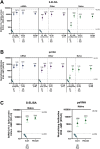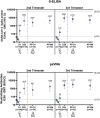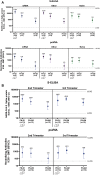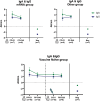Safety, immunogenicity and pregnancy outcomes in mothers and infants after vaccination with an adenovirus-vector COVID-19 vaccine during pregnancy
- PMID: 40808283
- PMCID: PMC12355676
- DOI: 10.1080/21645515.2025.2538340
Safety, immunogenicity and pregnancy outcomes in mothers and infants after vaccination with an adenovirus-vector COVID-19 vaccine during pregnancy
Abstract
COVID-19 during pregnancy can be associated with adverse pregnancy and infant outcomes. We assessed the safety, reactogenicity, and immunogenicity of maternal vaccination with Ad26.COV2.S COVID-19 vaccine and monitored serum and breast milk antibody levels in mothers and infants until 6 months post-delivery. This open-label Phase 2 study enrolled previously COVID-19 vaccinated or COVID-19-vaccine-naive healthy pregnant women in trimester two or three (NCT04765384). All women received a single dose of Ad26.COV2.S. Mothers and infants were followed-up for safety until 1-year post-partum and for immunogenicity, including antibodies in breast milk, until 6 months post-partum. Recruitment was stopped at 51 participants due to rapidity of roll-out of COVID-19 vaccines recommended during pregnancy. Ad26.COV2.S was well-tolerated regardless of previous COVID-19 vaccination history. All pregnancies resulted in a live infant, four were preterm. One serious adverse event of placental insufficiency Day-36 post-vaccination was considered vaccine-related by the investigator. One infant died due to complications associated with an unrelated ventricular septal defect. Ad26.COV2.S induced robust immune responses in women with different COVID-19 vaccination histories. Spike-binding antibody (SAbs) and virus neutralizing antibody (NAbs) titers at delivery tended to be higher in mothers vaccinated during trimester three. Maternal serum and cord blood were strongly correlated. 100% of infants had detectable SAbs at aged 6 months, and 70.6% had detectable NAbs, including 68.2% born to initially vaccine-naïve mothers. Maternal vaccination with an adenovirus-vector vaccine was well-tolerated and immunogenic in mothers and infants. These data could support the adoption of heterologous booster regimens during pregnancy and future adenovirus-vector vaccine development.
Keywords: Adenovirus vectors; COVID-19; SARS-CoV-2; neonates; passive antibody transfer; pregnancy; vaccine.
Conflict of interest statement
Gabriela Tapia-Calle was an employee of Johnson & Johnson at the time of this study.
Gloria Aguilar is an employee of Johnson & Johnson and holds stock/stock options in Johnson & Johnson, LLC.
Cynthia Robinson was an employee of Johnson & Johnson at the time of this study.
Benoit Baron is an employee of Johnson & Johnson.
David Lowson is an employee of Johnson & Johnson.
Bassem Maximos has nothing to declare.
Nicole Bet was an employee of Johnson & Johnson at the time of this study.
Veronica V. Rezelj was an employee of Johnson & Johnson at the time of this study.
Vitalija van Paassen is an employee of Johnson & Johnson and holds stock or shares in Johnson & Johnson, LLC.
Marit de Groot was an employee of Johnson & Johnson at the time of this study.
Mathieu Le Gars was an employee of Johnson & Johnson at the time of this study.
Frank Struyf was an employee of Johnson & Johnson at the time of this study and holds stock/stock options in Johnson & Johnson, LLC. He holds shares in GSK as remuneration for past employment.
Javier Ruiz-Guiñazú was an employee of Johnson & Johnson and holds stock/stock options in Johnson & Johnson, LLC. He holds shares in GSK as remuneration for past employment.
Figures





References
-
- World Health Organization . Global Advisory Committee on vaccine safety. Safety of immunization during pregnancy. A review of the evidence. 2014. [accessed 2024 Jun 11]. https://iris.who.int/handle/10665/340577?search-result=true&query=Global....
Publication types
MeSH terms
Substances
LinkOut - more resources
Full Text Sources
Other Literature Sources
Medical
Miscellaneous
